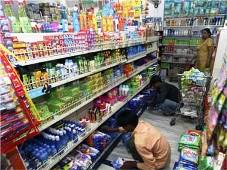 | « Back to article | Print this article |
 After struggling for much of FY13, fast moving consumer goods companies seem to have retrieved some of the lost ground in the last quarter.
After struggling for much of FY13, fast moving consumer goods companies seem to have retrieved some of the lost ground in the last quarter.
The results declared by key companies for the three months ended March 31 show most firms have managed to arrest the moderation in volume growth witnessed in previous quarters.
This trend was most obvious in the case of India’s largest FMCG company, Hindustan Unilever, which reported a six per cent volume growth -- a tad higher than the five per cent growth in the December 2012 quarter.
Gurgaon-headquartered GlaxoSmithKline Consumer Healthcare, meanwhile, reported an eight per cent volume growth for the March 2013 ended quarter higher than the six per cent volume growth it saw in the previous quarters.
Similarly, Ghaziabad-based Dabur India posted a 12 per cent volume growth (in its domestic business, which gives it nearly 70 per cent of its revenues), higher than the 9-9.5 per cent volume growth seen in previous quarters.
According to analysts, the uptick is thanks to the skillful moves by companies in response to external factors.
For instance, when palm oil prices fell during the quarter, HUL quickly offered 12- 20 per cent discounts on soaps, which use the input for its manufacture.
The result: a 13 per cent sales growth seen in soaps as well as detergents during the quarter under review.
Beverages, in contrast, benefitted from a consolidation drive by the company across its tea and coffee brands, resulting in an 18 per cent sales growth during the quarter, while personal products grew 12 per cent.
“The growth, for us, was broadbased during the quarter, so that was significant,”